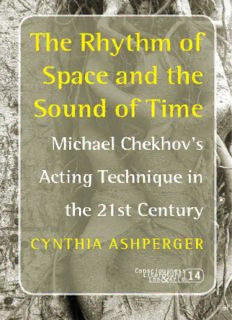
The Rhythm of Space and the Sound of Time: Michael Chekhov's Acting Technique in the 21st Century (Consciousness Literature and the Arts) PDF
Preview The Rhythm of Space and the Sound of Time: Michael Chekhov's Acting Technique in the 21st Century (Consciousness Literature and the Arts)
The Rhythm of Space and the Sound of Time Consciousness 14 Liter& ture the Arts General Editor: Daniel Meyer-Dinkgräfe Editorial Board: Anna Bonshek, Per Brask, John Danvers, William S. Haney II, Amy Ione, Michael Mangan, Arthur Versluis, Christopher Webster, Ralph Yarrow The Rhythm of Space and the Sound of Time Michael Chekhov’s Acting Technique in the 21st Century CynThiA AShpeRgeR Amsterdam - New York, NY 2008 Cover Design: Aart Jan Bergshoeff The paper on which this book is printed meets the requirements of “ISO 9706:1994, Information and documentation - Paper for documents - Requirements for permanence”. ISBN: 978-90-420-2387-1 ISSN: 1573-2193 ©Editions Rodopi B.V., Amsterdam - New York, NY 2008 Printed in the Netherlands TABLE OF CONTENTS Acknowledgments..........................................................................xi Preface.........................................................................................xiii Introduction....................................................................................1 1. Philosophical and Spiritual Influences of Michael Chekhov’s Acting Technique: A History Introduction....................................................................................13 The Influence of Johann Wolfgang von Goethe..............................16 The Influence of Arthur Schopenhauer...........................................22 Rudolf Steiner and the Influence of Anthroposophy........................26 Theosophy and its Origins: “No” to the Body.................................29 Anthroposophy and its Origins: “Yes” to the Body.........................31 The Three-Fold Nature of Man.......................................................35 The Anthroposophist Impact and “Possession” in Chekhov’s Technique..............................................................38 The Influence of Leopold Sulerzhitsky...........................................46 The Influence of Russian Symbolism..............................................48 Eastern Traditional Theatre and its Influence on Chekhov...............51 Conclusion.....................................................................................55 2. The Teaching Philosophy of the Michael Chekhov Association and its Contribution to Contemporary Pedagogy The History of the Michael Chekhov Association...........................65 The Michael Chekhov Association.................................................67 MICHA: The Super Objective........................................................70 vi The Rhythm of Space and the Sound of Time Teaching Philosophy: The Five Guiding Principles:........................77 The First Guiding Principle: Body and its Psychology.........78 The Second Guiding Principle: Invisible to Visible.............80 The Third Guiding Principle: Using the Higher Self to Synthesize...................................................................................84 The Fourth Guiding Principle: Each Element Awakening All Other Element.........................................................87 The Fourth Guiding Principle: Polarities...........................88 The Fifth Guiding Principle: Freedom from Personal?......91 Teaching Teachers The Qualities Necessary for a Teacher...............................95 Holistic Approach to Teaching Teachers............................99 Recent Growth of the Association..................................................101 The Learning structure...................................................................101 Current Hybrids with Chekhov’s Technique: “Ludo Theatre”........103 Contemporary Fusion with Oriental Theatrical Forms....................108 Other Contemporary Hybrids.........................................................110 Contemporary Scholarship............................................................114 Conclusion....................................................................................115 3. Current Pedagogy: MICHA Faculty Joanna Merlin................................................................................125 The Actors’ Ensemble...................................................................132 Fern Sloan........................................................................133 Ted Pugh..........................................................................135 Slava Kokorin...............................................................................138 Sarah Kane: Voice and Speech......................................................140 Lenard Petit: Movement................................................................146 The Intuitive Group David Zinder.....................................................................151 Per Brahe.........................................................................153 4. Current Pedagogy: Introductory Level Current Pedagogy: Introductory Level...........................................163 Spatial Exercises...........................................................................165 Backspace/Forward.......................................................................172 Sensations Exercises......................................................................177 Contents vii Objective and Subjective Atmosphere............................................180 Centering......................................................................................186 The Three Centres.........................................................................187 Centering and Characterization......................................................191 The Rope Dance................................................................193 Object/Image Dance I.......................................................197 Object/Image Dance II......................................................199 The Imaginary Body .....................................................................201 Character: Thinking Feeling Willing, in Stick, Ball, and Veil.........204 Body Parts with Qualities and Centers: The Door and the Imaginary Body.................................................207 Warm-up..........................................................................207 The Door Exercise............................................................208 The Imaginary Body.........................................................211 The Grotesque..................................................................214 Introductory Voice and Speech Exercises: Sound as Gesture..........216 Syllables as Independent Agents....................................................218 From Sounds to Syllables: Three Sample Exercises.......................218 5. Current Pedagogy: Advanced Level Current Pedagogy: Advanced Level...............................................229 Sequencing....................................................................................233 Imagination and Incorporation of Images.......................................234 Characterization Exercises: New Developments............................238 Colours Warm-Up.........................................................................241 Archetypal Gestures......................................................................243 The Ghost Exercise or The Doppelganger Exercise........................251 The Chekhov Clown......................................................................256 Greeting the Clown God...................................................257 Can You Show Me Something?..........................................257 The Character Clown........................................................258 Thinking, Feeling, Willing in Clown..................................259 Gargoyle to Gesture Exercise........................................................262 Action and Composition: New Developments................................263 Moment Gestures..............................................................264 Relationship Gestures.......................................................265 Relationship Gestures in Groups.......................................267 Intention/Objective PGs....................................................269 viii The Rhythm of Space and the Sound of Time Inner Objectives............................................................................278 Polarities Exercise.........................................................................281 Energy Transformation Exercises: Energy Corridors......................284 Advanced Voice and Speech Exercises Speaking the Text: Words and Phrases as Movement and Gesture...............................286 The Six Revelations of Speech......................................................289 Working with Text........................................................................289 Change!.........................................................................................290 Conclusion...................................................................................297 Appendices Appendix 1: Sense of Space......................................................303 Appendix 2: Space Expands and Contracts...............................304 Appendix 3: Filling the Space/ Owning the Space.....................305 Appendix 4: My Disposition.....................................................306 Appendix 5: Waking up the Space ...........................................307 Appendix 6: Qualities of Movement: Curved and Straight........308 Appendix 7: Staccato/Legato....................................................311 Appendix 8: Four Brothers Exercise.........................................313 Appendix 9: Three Sisters Exercise...........................................315 Appendix 10: Character: Stick, Ball, and Veil...........................318 Appendix 11: Basic Psychological Gestures..............................320 Appendix 12: The Objective Ball Game....................................323 Appendix 13: Desire/Justification.............................................324 Appendix 14: Ball-throwing: Three Balls with Words...............326 Appendix 15: Comedy/Tragedy = Styles...................................328 Appendix 16: Three-Word Variations.......................................331 Appendix 17: Focus on Sound: Monologues with Inner Gesture and Qualities................................333 Appendix 18: The Use of Personal Imagery..............................335 Bibliography.................................................................................339 Index............................................................................................359 For my father
Description: